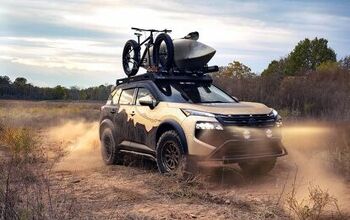Isn't It Ironic: Chevrolet Launches Engaging Phone App Intended to Curb Distracted Driving

Chevrolet is releasing a new smartphone app, titled Call Me Out, to help remind motorists to keep their eyes on the road and put their phones in their pockets while driving. Of course, individuals will still have to check their phones to receive the messages, which seems a little counterintuitive.
While the automaker appears to target “new and experienced drivers,” there’s nothing to indicate the product wouldn’t work equally well for experienced operators. Call Me Out basically functions as a guilt delivery system, using a person’s family and friends for ammunition. Once the app has been installed, the phone’s accelerometer and GPS wait until the car surpasses 5 mph. Then the phone plays recorded, personalized messages from the driver’s loved ones, reminding drivers to keep driving and avoid distractions.
We’d like to applaud General Motors for taking strides to reduce distracted driving, but we can’t really do that when taking the larger picture into consideration.
General Motors, like most automakers, is pushing for increasingly complex infotainment systems and vehicle connectedness. If Chevrolet truly cared about the safety of its customers, it would implement a feature like this on its own vehicles. Instead, it applied it to your personal phone and opened up more opportunities to use proprietary in-car systems. It’s almost diabolically clever, assuming that was the intent.
Besides, anyone old enough to drive will understand how to uninstall this app immediately. Putting Call Me Out on your teenager’s phone is likely to only be helpful if you have a strong rapport with them. However, if that’s the case, then you probably don’t need to go the extra mile to digitally guilt your child into being a safe driver. They’ll have already listened you and will actively attempt not to bring shame upon the family.
The software also seems as though it would be active anytime you are a passenger, meaning there’s likely some simple way to disable it. Otherwise, you’d be left reading a book anytime you hopped in a car with someone or decided to take the bus.
That doesn’t make the app a truly terrible or malicious concept, though. We could see it saving a few lives in the long run and helping build better driving habits among willing participants. If you’re a mature individual that simply has a compulsion to always look at their phone, regular reminders that those close to you don’t want you to die could prove helpful in curbing that behavior.
There is also some “gamification” to encourage users to stick with the app. The less someone handles a phone while driving, the higher the score on the leaderboard. Individuals can then brag to their families about how they’re the safest driver in the group and virtue signal publicly.
GM cited a recent Research Now survey, which claimed 84 percent of people agreed that distracted driving while handling a phone was dangerous, despite 90 percent of drivers admitting to doing so. But we think automotive infotainment can be equally distracting and we’re not alone. AAA Foundation research showed that Apple CarPlay and Android Auto were frequently less distracting for drivers than the infotainment systems found in most new vehicles. However, none devices or systems were deemed truly safe to use while in motion.
“Drivers must use common sense when it comes to technology inside the vehicle. Just because it is available, doesn’t make it safe to use,” said Jake Nelson, AAA director of traffic safety and advocacy. “Smartphone companies and automakers must collaborate to reduce the potential for distraction that technology places on drivers. The airline industry doesn’t compete on safety, and neither should automakers. Motorists deserve better.”
Interested parties can download Call Me Out from the Google Play Store free of charge. However, iPhone users will be out of luck, as GM made no mention of a version compatible with iOS.
[Image: General Motors]

A staunch consumer advocate tracking industry trends and regulation. Before joining TTAC, Matt spent a decade working for marketing and research firms based in NYC. Clients included several of the world’s largest automakers, global tire brands, and aftermarket part suppliers. Dissatisfied with the corporate world and resentful of having to wear suits everyday, he pivoted to writing about cars. Since then, that man has become an ardent supporter of the right-to-repair movement, been interviewed on the auto industry by national radio broadcasts, driven more rental cars than anyone ever should, participated in amateur rallying events, and received the requisite minimum training as sanctioned by the SCCA. Handy with a wrench, Matt grew up surrounded by Detroit auto workers and managed to get a pizza delivery job before he was legally eligible. He later found himself driving box trucks through Manhattan, guaranteeing future sympathy for actual truckers. He continues to conduct research pertaining to the automotive sector as an independent contractor and has since moved back to his native Michigan, closer to where the cars are born. A contrarian, Matt claims to prefer understeer — stating that front and all-wheel drive vehicles cater best to his driving style.
More by Matt Posky
Latest Car Reviews
Read moreLatest Product Reviews
Read moreRecent Comments
- Kjhkjlhkjhkljh kljhjkhjklhkjh A prelude is a bad idea. There is already Acura with all the weird sport trims. This will not make back it's R&D money.
- Analoggrotto I don't see a red car here, how blazing stupid are you people?
- Redapple2 Love the wheels
- Redapple2 Good luck to them. They used to make great cars. 510. 240Z, Sentra SE-R. Maxima. Frontier.
- Joe65688619 Under Ghosn they went through the same short-term bottom-line thinking that GM did in the 80s/90s, and they have not recovered say, to their heyday in the 50s and 60s in terms of market share and innovation. Poor design decisions (a CVT in their front-wheel drive "4-Door Sports Car", model overlap in a poorly performing segment (they never needed the Altima AND the Maxima...what they needed was one vehicle with different drivetrain, including hybrid, to compete with the Accord/Camry, and decontenting their vehicles: My 2012 QX56 (I know, not a Nissan, but the same holds for the Armada) had power rear windows in the cargo area that could vent, a glass hatch on the back door that could be opened separate from the whole liftgate (in such a tall vehicle, kinda essential if you have it in a garage and want to load the trunk without having to open the garage door to make room for the lift gate), a nice driver's side folding armrest, and a few other quality-of-life details absent from my 2018 QX80. In a competitive market this attention to detai is can be the differentiator that sell cars. Now they are caught in the middle of the market, competing more with Hyundai and Kia and selling discounted vehicles near the same price points, but losing money on them. They invested also invested a lot in niche platforms. The Leaf was one of the first full EVs, but never really evolved. They misjudged the market - luxury EVs are selling, small budget models not so much. Variable compression engines offering little in terms of real-world power or tech, let a lot of complexity that is leading to higher failure rates. Aside from the Z and GT-R (low volume models), not much forced induction (whether your a fan or not, look at what Honda did with the CR-V and Acura RDX - same chassis, slap a turbo on it, make it nicer inside, and now you can sell it as a semi-premium brand with higher markup). That said, I do believe they retain the technical and engineering capability to do far better. About time management realized they need to make smarter investments and understand their markets better.




































Comments
Join the conversation
“The airline industry doesn’t compete on safety, and neither should automakers.” BAHAHAHAHA!!!! Could be because airplanes aren’t “driven” by someone who was given a license to operate simply because they have a pulse. Thousands of barely coherent, distracted Goobs operating 5000 lb. rolling missles within close proximity of each other creates an easy opportunity to “compete on safety” (or at least to pretend to, as is the case with this app).
Ridiculous! Once the phone is tied into the vehicle's Bluetooth/USB network, the phone itself should be mute... the way most other OEMs do it. The bad news is, I'm buying a Chevrolet--just waiting for delivery as it's a special order rather than off-the-lot purchase.